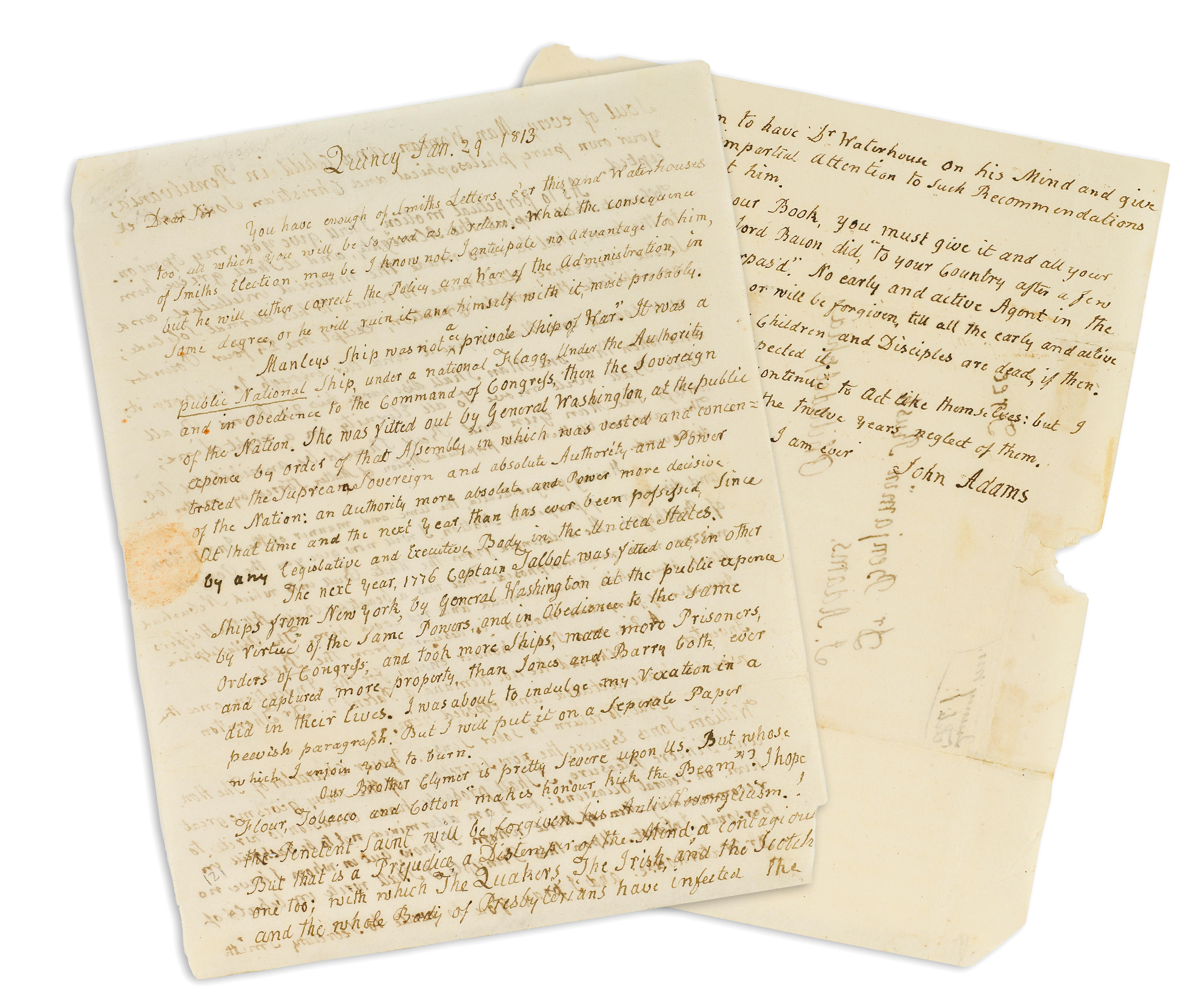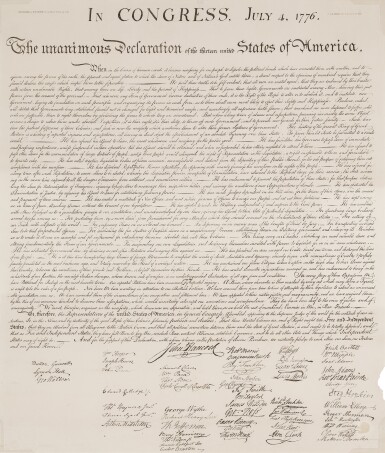ADAMS, John Quincy Twelve letters signed ("John Quincy Adams") as Secretary of State, to Spanish Ambassadors Don Francisco Vives and Don Joaquin Anduaga, Department of State, Washington, 3 May 1820 to 29 May 1822. Together 44 pages, folio, occasional browning, several with slight dampstains . THE ACQUISITION OF FLORIDA FROM SPAIN: AN ARCHIVE DOCUMENTING FINAL NEGOTIATIONS FOR THE ADAMS-ONÍS TRANSCONTINENTAL TREATY A highly significant correspondence concerning Adams's dogged efforts to ensure Spanish ratification of the historic Adams-Onís or Transcontinental Treaty, by which the United States acquired all of East Florida, Spain renounced all claims to Oregon, the southern border of the U.S. was fixed at the Sabine River and U.S. possessions extended westward along the 42nd parallel to the Pacific Ocean. Unable to effectively administer their colonial possessions, Spain had found it increasingly difficult to prevent raids on U.S. settlements by Florida's Seminole Indians. In response, the American government authorized Andrew Jackson's campaigns against the Seminoles, which resulted in Jackson's unauthorized punitive expedition into Florida in 1818. In the diplomatic furor which ensued, Adams initiated negotiations with Spanish ambassador Luis de Onís y Gonzales and on 22 February 1819 signed the preliminary articles. The treaty would prove vital to the growth of the nation and in the words of one authority constituted "the greatest diplomatic victory won by any single individual in the history of the United States" (Bemis, John Quincy Adams and the Foundations of American Foreign Policy , p. 340). A minor flaw in the treaty provisions, relating to two recent grants in Florida, forced negotiations to be reopened. Then, before ratification could be completed, Ferdinand VII was deposed in January 1820, placing the entire treaty in jeopardy. The nullification of the land grants in Florida became the pretext by which ratification was postponed. In this fascinating group of letters, Adams determinedly presses the new Spanish ambassadors to complete the process of ratification. On 3 May 1820, Adams forcefully answers Vives's objections to the treaty and rejects his insistence that the U.S. must not recognize the new South American republics. "As a necessary consequence of the neutrality between Spain and the South American provinces, the United States can contract no engagement not to form any relations with these provinces...Mr. Onis had long and constantly been informed that a persistance in it would put an end to the possible conclusion of any treaty whatever." As to the issue of Ferdinand VII's Florida land grants, he explains that the object of a particular clause was "to guard your Government, and all persons who might have had an interest in any of the annulled grants, against the possible expectation or pretence that those grants would be made valid by the treaty...Mr. Onís...declared that those grants were null and void." Asserting that any mistake within the treaty was the fault of Onís, Adams threatens to increase American demands, and to include Texas, if ratification does not proceed: "if any further delay...should occur, the United States could not hereafter accept either of $5,000,000 for the indemnities due to their citizens by Spain, nor of the Sabine for the boundary between the United States and the Spanish territories." On 8 May, in an 18-page letter, Adams insists upon "the absolute obligation by which His Catholic Majesty was bound to ratify the treaty within the term stipulated...the reasons alleged for his witholding the ratification are altogether insufficient for the justification of that measure...the United States have suffered by it the violation of a perfect right..." The treaty, he reminds them "was signed after a succession of negotiations of nearly twenty years' duration, in which all the causes of difference between the two nations had been thoroughly discussed." Adams cites international law
ADAMS, John Quincy Twelve letters signed ("John Quincy Adams") as Secretary of State, to Spanish Ambassadors Don Francisco Vives and Don Joaquin Anduaga, Department of State, Washington, 3 May 1820 to 29 May 1822. Together 44 pages, folio, occasional browning, several with slight dampstains . THE ACQUISITION OF FLORIDA FROM SPAIN: AN ARCHIVE DOCUMENTING FINAL NEGOTIATIONS FOR THE ADAMS-ONÍS TRANSCONTINENTAL TREATY A highly significant correspondence concerning Adams's dogged efforts to ensure Spanish ratification of the historic Adams-Onís or Transcontinental Treaty, by which the United States acquired all of East Florida, Spain renounced all claims to Oregon, the southern border of the U.S. was fixed at the Sabine River and U.S. possessions extended westward along the 42nd parallel to the Pacific Ocean. Unable to effectively administer their colonial possessions, Spain had found it increasingly difficult to prevent raids on U.S. settlements by Florida's Seminole Indians. In response, the American government authorized Andrew Jackson's campaigns against the Seminoles, which resulted in Jackson's unauthorized punitive expedition into Florida in 1818. In the diplomatic furor which ensued, Adams initiated negotiations with Spanish ambassador Luis de Onís y Gonzales and on 22 February 1819 signed the preliminary articles. The treaty would prove vital to the growth of the nation and in the words of one authority constituted "the greatest diplomatic victory won by any single individual in the history of the United States" (Bemis, John Quincy Adams and the Foundations of American Foreign Policy , p. 340). A minor flaw in the treaty provisions, relating to two recent grants in Florida, forced negotiations to be reopened. Then, before ratification could be completed, Ferdinand VII was deposed in January 1820, placing the entire treaty in jeopardy. The nullification of the land grants in Florida became the pretext by which ratification was postponed. In this fascinating group of letters, Adams determinedly presses the new Spanish ambassadors to complete the process of ratification. On 3 May 1820, Adams forcefully answers Vives's objections to the treaty and rejects his insistence that the U.S. must not recognize the new South American republics. "As a necessary consequence of the neutrality between Spain and the South American provinces, the United States can contract no engagement not to form any relations with these provinces...Mr. Onis had long and constantly been informed that a persistance in it would put an end to the possible conclusion of any treaty whatever." As to the issue of Ferdinand VII's Florida land grants, he explains that the object of a particular clause was "to guard your Government, and all persons who might have had an interest in any of the annulled grants, against the possible expectation or pretence that those grants would be made valid by the treaty...Mr. Onís...declared that those grants were null and void." Asserting that any mistake within the treaty was the fault of Onís, Adams threatens to increase American demands, and to include Texas, if ratification does not proceed: "if any further delay...should occur, the United States could not hereafter accept either of $5,000,000 for the indemnities due to their citizens by Spain, nor of the Sabine for the boundary between the United States and the Spanish territories." On 8 May, in an 18-page letter, Adams insists upon "the absolute obligation by which His Catholic Majesty was bound to ratify the treaty within the term stipulated...the reasons alleged for his witholding the ratification are altogether insufficient for the justification of that measure...the United States have suffered by it the violation of a perfect right..." The treaty, he reminds them "was signed after a succession of negotiations of nearly twenty years' duration, in which all the causes of difference between the two nations had been thoroughly discussed." Adams cites international law














Try LotSearch and its premium features for 7 days - without any costs!
Be notified automatically about new items in upcoming auctions.
Create an alert